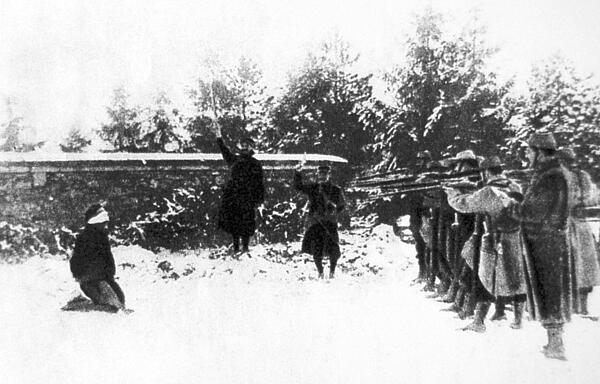World War One executions
During the course of World War One, Britain executed 306 British and Commonwealth soldiers, including 25 Canadians, 22 Irishmen and 5 New Zealanders. These executions took place for crimes including desertion and cowardice, but remain a source of controversy, with many believing they should be pardoned as they were likely suffering from what we now call ‘shell shock’.
Between the start of the war in 1914 and the end in 1918, the British Army identified 80,000 as suffering from symptoms now known as ’shell shock’. They all stated that they could not cope with being returned to the front line and so had deserted. Once they were caught, they received a court martial and, when sentenced to death, would face a 12-man firing squad.
For many, the idea that someone would be sentenced to death for being unable to cope with the horrors of the front line is abhorrent. Many suggest that the drain on morale, constant artillery fire, conditions and constant fear of the unknown would make anyone want to return home particularly when they were watching their friends and colleagues die on a daily basis.
Victor Silvester wrote of his experiences:
“We went up into the front line near Arras, through sodden and devastated countryside. As we were moving up to our sector along the communication trenches, a shell burst ahead of me and one of my platoon dropped. He was the first man I ever saw killed. Both his legs were blown off and the whole of his body and face was peppered with shrapnel. The sight turned my stomach. I was sick and terrified but even more frightened of showing it.”

In spite of the horrors faced by soldiers, senior military commanders would not accept this as a reason for any man failing to return to the front line and this was simply considered desertion. Commanding officers also felt almost universally that this behaviour should be punished in the harshest possible manor to ensure that others did not follow suit and “flee in the face of the enemy”.
There were few soldiers who wanted to be in the firing squad, and many were forced to take part while they recovered from wounds at base camp - as long as they were able to fire a Lee Enfield rifle. There were even some ‘men’ in the firing squad who were under the age of 16, and this was also the case for those who were shot for cowardice.
James Crozier from Belfast was one of the men shot for desertion, aged just 16. Before his execution, he was given so much rum, that he passed out and had to be carried to the place of execution. Officers later revealed that they were concerned the soldiers in the firing squad would refrain from carrying out their orders on these grounds.
Another soldiers executed at the age of just 16 was Abe Bevistein, who was shot by firing squad at Labourse near Calais. After being found guilty of deserting his post, he wrote to his mother:
"We were in the trenches. I was so cold I went out (and took shelter in a farm house). They took me to prison so I will have to go in front of the court. I will try my best to get out of it, so don't worry."
Due to the supposed crimes that were committed by the men, their names were excluded from war memorials and many of their relatives were simply told that they had died in France or Belgium.
In August 2006, the British Defence Secretary Des Browne announced that there would be a general pardon for all 306 men executed in World War One. A new law passed in November of the same year and was included in the Armed Force Act. This pardoned the men across the British and Commonwealth armies and also removed the stain of dishonour against their names. However, it did not cancel out their sentences.
Des Browne said:
"I believe it is better to acknowledge that injustices were clearly done in some cases - even if we cannot say which - and to acknowledge that all these men were victims of war. I hope that pardoning these men will finally remove the stigma with which their families have lived for years."
However, many campaigners are still unhappy with the way the issue was handled one hundred years ago. One reason for this is that four more men deserted in the UK than in France or Belgium, but no one was ever executed for desertion in Britain.
Many also questioned the legal status of court martials, stating that the accused were not provided with access to a formal legal representative as a a defence. Additionally, court martials should have included a judge advocate but very few did - the condemned men were actually allowed to petition the king before their execution, but the fact that none did suggests they were unaware of this right. Many were even prevented from speaking to Padres before their execution.
Some campaigned have claimed that the executions of the soldiers was a class issue - while James Crozier was shot for deserting his post, 2nd Lieutenant Annandale was found guilty of the same thing two weeks early but was not sentenced to death due to “technicalities”. During the war, fifteen officers who were sentenced to death received a royal pardon. Additionally, in 1916 an order stated that all officers of the rank of captain or above would be sentenced to death of they showed cowardice, with no medical excuse tolerated. However, if they were found to be suffering from neurasthenia they would be pardoned. This was not the case for soldiers.
MLA Citation/Reference
"World War One executions". HistoryLearning.com. 2026. Web.
